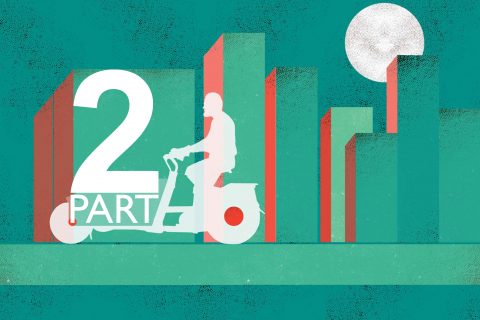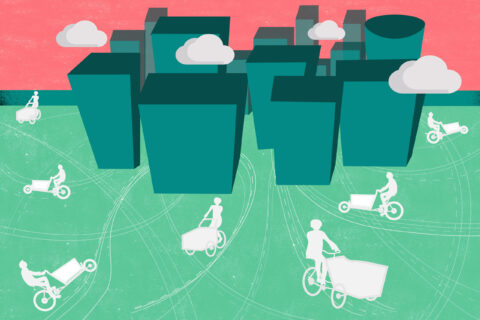In the first of our two-part series on cargo bikes in London, Fare City want to know: ‘What are cargo bikes and why do Londoners use them?’ To answer this question, we have cut a qualitative cross-section through the topic, which draws upon extensive interviews with key stakeholders and is underpinned by London-specific policy and insight. Fare City ultimately want to understand how accessible, equitable and sustainable cargo bikes are, and whether they can become a more commonly used mode of transport for Londoners.

On a quiet street, just off London’s Strand, my lift to Waterloo Station pulls up just as it begins to rain. Ordinarily, I would have thought nothing of it, but on this occasion I cast my eyes skyward, aware that I will imminently be stepping into a cargo bike operated by London-based courier company, Pedal Me. My rider, Roy, advises me to stay under cover as he proceeds to efficiently stow the bike’s seat protector. He then presents me with a weatherproof poncho, my only defence against the rain. “You make it look stylish,” he jokes.
After he explains where I should sit and the route we will be taking, we are soon filtering our way among buses and black cabs before we slip onto one of the city’s cycle-only ‘Quietways’. It is only during the crossing of Waterloo Bridge that I begin to feel the sting of rain against my face, but then, a few minutes later, it is all over. My face aside, I am not only dry, but have been delivered directly to the station entrance and with ample time in which to catch my train. Only the curious glances of fellow commuters alert me to the fact that this may have been something other than a typical city journey.
A few weeks earlier, in the same spot that I’d just been picked up from, I had met Pedal Me’s co-founder Ben Knowles. Prior to sitting down to discuss the company and his thoughts on cargo bikes in London, he had given me a quick tour of the bike: “It’s got e-assist, it’s got these Bosch units which are the most powerful ones on the market, and we also fit them with these banners in which we put thermal boxes so that we can do both cold and hot food deliveries”.
While the technology may be new, the use of cycles to transport goods and other people is not. Cargo bikes have in fact been plying London’s streets since the 1880s. Originally the vehicle of choice for bakers and greengrocers, they are part of the city’s rich transport heritage, but have largely gone unnoticed, unloved and under-utilised. This is at least partly the result of two technologies which emerged at the same time, and which subsequently led to modes of transport that would change the way Londoners moved forever.
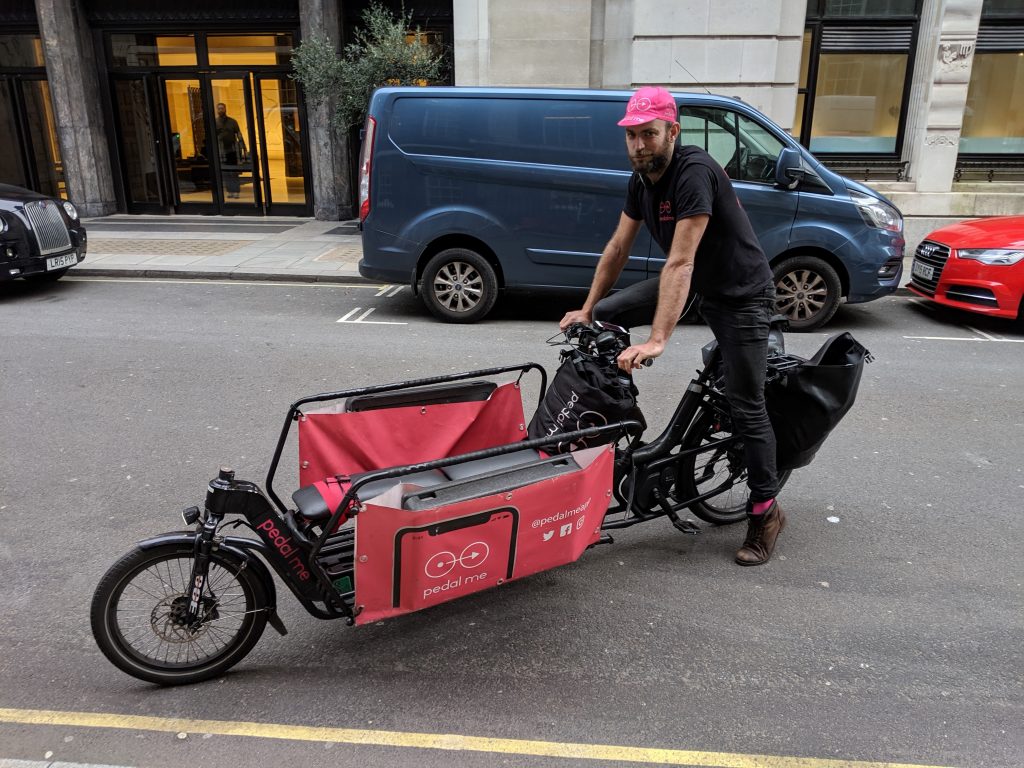
In the early 1890s, electricity and the combustion engine made their London debuts in the guise of the tube, the tram and the car, respectively. Prior to their introduction to the city’s streets, Londoners had relied on walking, horse-drawn omnibuses and carriages, Thames steamboats and to a lesser extent the humble bicycle, introduced just a decade before.
As the technologies developed, so did the modes of transport. Motorised vehicles soon included buses, Hackney carriages and vans which quickly became the staple among both small and large businesses for carrying goods across the city. Today in London, Knowles attributes “14% of all trips in London as being made by a van”. This is a huge percentage, but perhaps unsurprising, given the ubiquitous white vans’ association with both traditional tradesmen and newer online markets which still necessitate physical delivery.
While Londoners identify with, and understand, these modes of transport: buses, black cabs and vans, why do so few know what cargo bikes are, especially given that in the last few years they have been popping up from Hackney to Hammersmith and everywhere in between? Cargo bikes are essentially pedal powered vehicles which share components with a traditional bicycle but look different, depending on what style they are. The most common types are ‘box bikes’, those with a box between the rider and front wheel, while ‘mid’ and ‘long-tails’, are those with a regular riding position but with more room to carry cargo at the back of the bike.
The Commercial Case
2019 was a big year for the cargo bike. A combination of national and London-specific policy coincided with initiatives which have resulted in a sharp increase of cargo bike use in the freight carrying commercial sector. The year’s first quarter saw the publication of the Department for Transport (DfT’s) ‘The Last Mile’ paper in March, followed by the launch of the DfT’s eCargo Bike Grant Fund in April.
While the former made the case for greater cargo bike use, the latter served to unlock a £2million funding stream designed to encourage the uptake of cargo bikes for businesses nationwide. April 2019 also marked the beginning of the London Ultra Low Emission Zone (ULEZ), while Team London Bridge launched their ‘Bikes for business’ initiative in partnership with local firms.
Several London businesses have already taken advantage of the DfT’s funding to roll out their own in-house cargo bike couriers. One such company is subscription-based florist, Freddie’s Flowers. The company’s logistics manager, Alice Scobie, confirms that “For the purchase of our first six bikes we received an eCargo bike grant”. Though the company have only recently utilised the DfT funding, they were in fact early adopters who first began using cargo bike courier companies back in August 2017.
Today the company complete “approximately 3,000 deliveries a week by cargo bike across London” using a combination of Pedal Me, Zedify and, to a lesser extent, their own bikes and couriers. For Scobie the benefits of using Cargo bikes are clear: “The biggest advantage for us has been that customers are actually receiving their flowers! Alongside this, as our drops are very dense, the cost per drop is cheaper, or in line with the cost if we were using a van for the deliveries”.
Prior to the switch to cargo bikes the company found that many deliveries were simply not making their way to customers: “Lots of our deliveries are to businesses and apartments, and our van drivers deliver from about 3am, aiming to be finished by about 12pm (to avoid London’s traffic). Obviously, not many offices or concierges are open at this time in the morning, meaning that boxes were being left outside the buildings and often would be stolen”. Despite pushing back start times the traffic was so bad that drivers were not able to complete all their deliveries on time.
By way of comparison, “Cargo bike riders are also able to park their bikes without too many issues, unlike a van, so they would be able to spend more time getting into the building and making sure the flowers got to the correct person”. The use of cargo bikes has also benefitted the company and its customers in other ways: “Using cargo bikes to deliver our flowers supports the brand identity really well, and (our customers) are happy to hear we are doing what we can to cut down on emissions”.
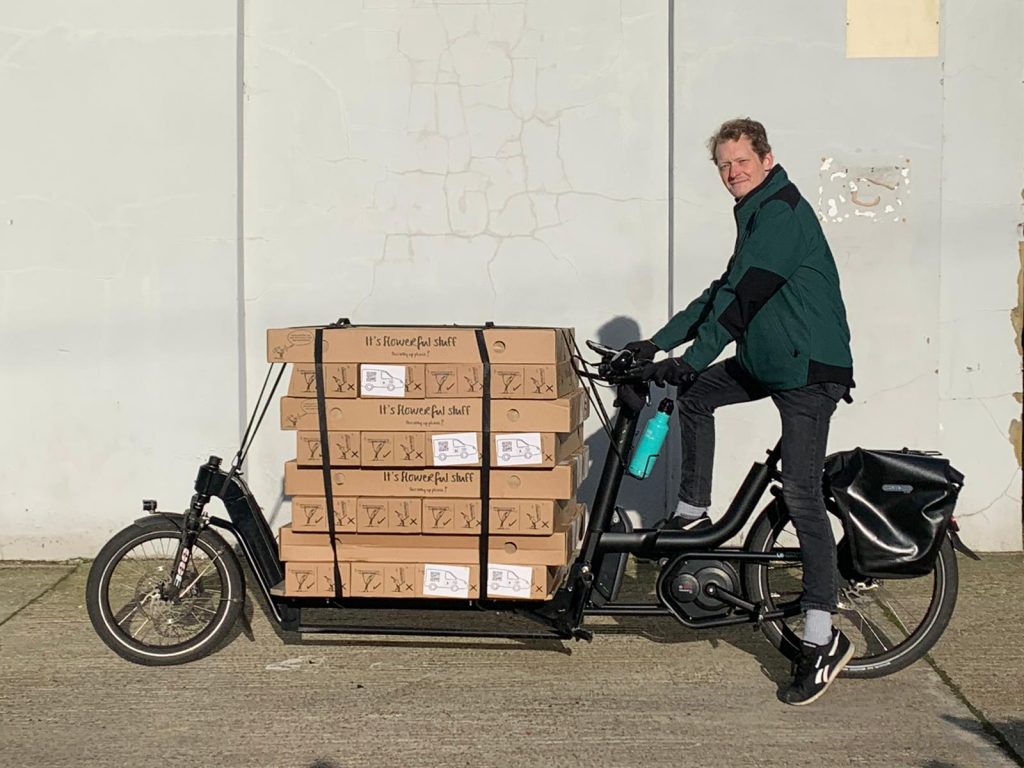
The productivity gains which cargo bikes offer companies over vans is confirmed by Pedal Me’s Ben Knowles: “They’re 35% quicker than a motor vehicle (in London), which makes them more efficient, as more drops can be made”. This is in part aided by their versatility in being able to access more routes, which are otherwise inaccessible to vans. In addition to being quicker, more efficient and more sustainable, Knowles believes that the presence of cargo bikes delivers a feel-good factor to other city users and “adds to the life of the city”. This is an observation shared by Scobie, who relates that “people are happy to see the bikes out and about delivering and are interested to learn more about it”.
The Anti-Uber
While London’s freight based commercial cargo bike sector is taking off, Pedal Me also provide a passenger carrying service, something which Knowles proudly refers to as “the anti-Uber”. The fact that Pedal Me’s riders are ‘employees’ as opposed to Uber-style ‘contractors’ is only part of the appeal for customers who use this service. Rachel, a regular user, believes that this distinction is important and is “ultimately the type of thing that ought to make it work, sitting in the space between black cabs and Uber”.
Rachel, who lives in Central London, uses the service several times a week and is very clear about her reasons for doing so: “It enables things which wouldn’t otherwise be possible, to leapfrog over sticky situations”. These ‘sticky situations’ involve Rachel’s three children, aged 7, 10 and 12, who use Pedal Me to access activities including swimming and sewing.
Unlike an Uber, or public transport, the advantage of cargo bikes in being able to pull up outside a front door, is important in ensuring peace of mind for parents concerned for the safety of their children on the capital’s streets “Our other child swims at the Caledonian Road Pool, there’s a really good bus but he would have to wait for the bus at around 8.10 pm, beside one of those shrines to a teenager stabbed to death”. Despite the expense, Rachel sees the value of the service as providing a reliable, and safer, alternative to taxis or public transport “for journeys which in an ideal world the kids should be able to do on their own, but they just can’t”.
Another big pull for Rachel and her children is the sheer enjoyment of being carried through the capital by bike, and the closer interaction with not only the city but the rider: “The kids absolutely love it”. While she admits that non-essential trips are considered an “extravagance”, the use of cargo bikes for Londoners who may not otherwise be able to cycle cannot be underestimated in promoting social inclusion.

Inclusivity and the right to the city are fundamental tenets for Cycling Without Age. The charity, which has a London chapter, utilises cargo bikes to offer the elderly regular trips around their local neighbourhood. Similarly, disabled cycling charity Wheels for Wellbeing was founded by Londoner Janet Paske in 2007 and promotes the use of adapted cycles to encourage disabled Londoners to cycle.
During our interview, Knowles described how his early experiences of running projects which encouraged Londoners “who wouldn’t have ordinarily cycled” to do so, did in fact contribute to his idea of setting up Pedal Me. The benefit of this experience can be seen in the company’s current cargo bikes, modified Dutch-built Urban Arrows. The bikes can carry a standard wheelchair, while the point-to-point service, aided by highly trained and considerate riders, makes them very convenient as a means of transport for many disabled passengers.
Family Flexibility
While the use of cargo bikes for commercial purposes, whether freight or passengers, has steadily increased, what about their use in the non-commercial sector, amongst families, friends and individuals? Cargo Bike supplier Harry Walton owns Flying Dutchman, a bike shop located in Central London’s Kings Cross district. Surprisingly, neither Walton nor his clientele identify as cyclists: “This is parents taking kids to school, bikes that come equipped with mudguards and lights and kickstands and racks which are normally retrofit components, but they are practical components”.
In the last few years, Walton has seen a noticeable rise in cargo bike buying customers, something which he attributes to parents who meet at the school gates: “They mix, they interact, that’s when the cargo bike seed is planted”. Two such parents who were early adopters of cargo bikes, and who are incidentally customers of Walton’s, are Tim and Carl. Both are fathers of two and live near to one another in West London.
Tim sees the real value of the cargo bike in its sheer flexibility: “We take the girls to school, go places with them such as hospital appointments and clubs, though we will also sometimes do the shopping or take things to the tip”. Crucially the bike has worked around the family’s lifestyle as opposed to the other way around. A self-confessed “lazy person by nature”, Tim believes that using a cargo bike “enables me to do all sorts of things more quickly, and more pleasantly as well”, and as a result has replaced the family’s car for many short journeys.
A keen cyclist, Tim concedes that while many people do not care about cycling, they do care about “being able to do things that matter to them, and being able to do them safely”, something which he is certain a cargo bike facilitates. Like Tim, Carl is also a keen cyclist and one that almost exclusively uses bikes over his car for all but the longest journeys. Aside from slotting into his family’s busy lifestyle, as an owner of multiple cargo bikes Carl willingly pushes the boundaries: “On my Surly long-tail bike, I’ve carried other bikes, ladders, cement bags and even a canoe”.
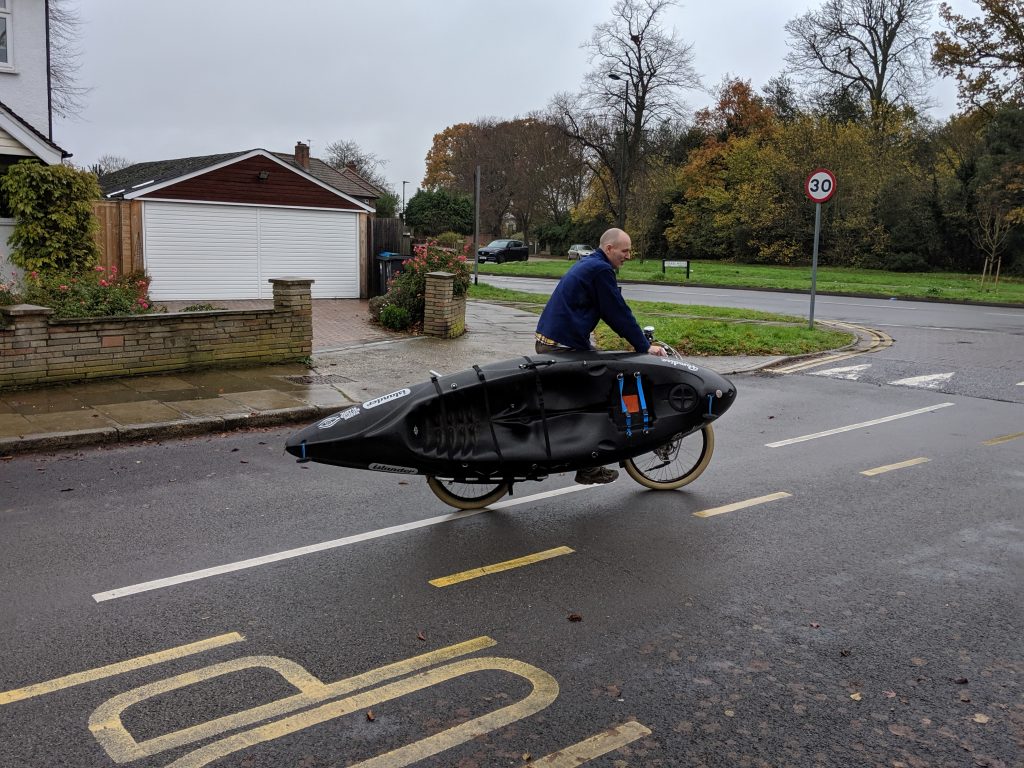
As we chat, Carl’s neighbour, Alison, cycles past on her Bakfiets cargo bike. Alison is a mother of three who began using a cargo bike five years ago. “Everyone should get a cargo bike – it’s completely revolutionized my life”. Though her three children are now too big to be carried, she continues to use it owing to the flexibility which it still affords her: “I can get a trolley load of shopping in it, we also go camping with it – you can stick a weekend’s camping gear in there”. Like Knowles, both Alison and Carl are keen for the public at large to understand the potential of cargo bikes, something which they consider important if they are to be taken up more widely.
The potential of the cargo bike is undoubtedly wide-ranging, yet it has so far failed to catch the imagination of Londoners in the way that it has in nearby European cities, such as Amsterdam or Copenhagen. But why? On the surface at least, the slow yet steady shift towards choosing more sustainable lifestyles suggests that Londoners would be advised to take a closer look at this versatile mode of transport.
Part Two of Fare City’s study on cargo bikes in London will cast a more critical eye over the challenges which cargo bikes face in being adopted more broadly among the city’s non-commercial sector. Identifying and navigating a course through key issues including safety, regulation, infrastructure, demand and culture, will be crucial if there is to be a meaningful shift towards cargo bikes playing a bigger role in the future of how Londoners travel.


